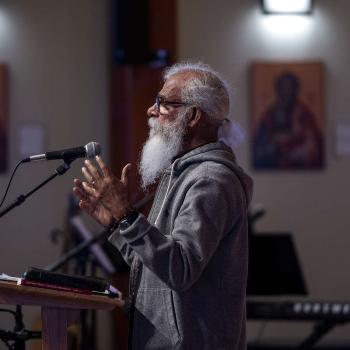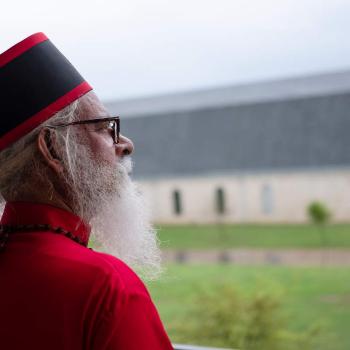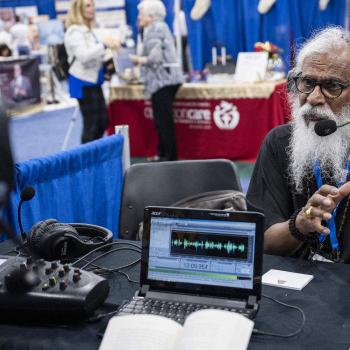Gospel for Asia (GFA), Wills Point, TX, USA
I had a brief conversation with one of the leaders at Gospel for Asia (GFA) the other morning, and we were talking about discipleship and what it means to follow Christ. It was interesting. He was talking about how many of us tend to hear “follow Christ,” and we get this idea in our heads that all we need to do is have the right information, and then it’s up to us to figure out the rest by ourselves.
It seems everyone has their own idea of what it means to follow Christ. Some believe that as long as you feel like you’re doing it right, then you are doing right. But in reality, the foundation that has always been at the very heart of Biblical and historical discipleship is the idea of implementing spiritual disciplines, or holy habits of the heart, as part our lives. Things like prayer, worship, Holy Communion, fellowship, evangelism—these and others like them are the very things that regulate and direct our heart over and over again to what it truly looks like to follow Christ. It is not just the fuzzy feelings we get, but rather the habits that we allow, entertain and commit to that will make or break us as disciples of Christ.
Growing up, I was very involved in gymnastics. I remember when I first started at each practice, my coach would make us do the same moves again and again. It seemed pointless at first to me why he would make me keep repeating the basics when I felt I had already grasped them just fine. But if you have ever played sports, then you know it’s those consistent, basic moves that are vital habits to master before harder skills can be learned. As I progressed in gymnastics, those seemingly “pointless skills” started to make sense all of a sudden.
In any sport, your coach will make you do conditioning and routines. Sometimes you may not understand why or what he is trying to do. But as you continue to practice those things, they start to become a part of you, even without you realizing it. And eventually, the coach will move you on to learn new disciplines and skills and those old habits he instilled into you begin to click and make sense.
Take the example of music, which I am not any good at. My kids have started taking music classes at school, and the things they are learning right now are very basic. My daughter recently had a little recital where they were playing bells. As they were practicing, my daughter kept telling me, “The teacher wants us to stomp our foot when we do the bells.” What was the teacher trying to get them to learn through that? Timing. By the time the kids at her school get to sixth grade, they know how to read music and play an instrument with ease. But where does it start? It starts with stomping your foot. To my daughter, stomping her foot seems like a totally disconnected thing, maybe even funny at times, and yet it is so important. It’s teaching her about rhythm and timing, and before long she will come to the place where timing becomes so natural she can play her instrument on the beat without even thinking about it. For a musician, timing becomes an internal habit that makes the music come alive.
So how does practicing tumbling day after day, or running laps around the court, or stomping your foot help someone to become an amazing gymnast, basketball player or pianist? It happens patiently, over time. The things we allow and purposely put into our lives as routines will over time become an automatic part of who we are.
This is what it means to be a disciple of Christ. It is not about having everything all together right now. Rather, it is a journey we are on. And it starts off very simply. The things God is doing in your life right now which may seem small and basic are actually the foundations of who God is making you to be.
So often we get frustrated with ourselves because we compare where we are right now with where we want to be. We look in the mirror, and we get discouraged with how we responded to that person this afternoon. We don’t understand that God doesn’t see our lives the same way we see them. He sees these shortcomings as opportunities to consistently drive us toward Himself. And for what reason? He does it so that in these areas where we are trying so hard to do it in our own strength, we end up learning to give up and depend on Him instead. Depending on the Lord becomes part of who we are almost intuitively. It is slow, like an oak tree growing over time, getting stronger and stronger.
I was talking to our School of Discipleship students about this not too long ago, and I used the example of driving. If you have ever learned to drive a stick shift, you can remember starting off so tense and hyper-aware of everything you are doing. In my driving instructor’s car, I was grasping the steering wheel so tightly he had to keep telling me to relax. I have brown skin so when my knuckles turn white you know it’s pretty serious. I was so nervous thinking I was going to kill everyone on the road. But now, years later, driving a stick shift has become so normal I do it without even thinking.
More than once, I’ve found myself getting into my car and all of a sudden I’m home. I have no memory of the drive home or even turning on my car. How does that happen? It’s because I’ve driven that same route over and over. It’s become almost second nature.
Discipleship is God working His principles into our lives over and over again. It’s also us participating with Him—paying attention to and practicing the disciplines He has for us, so that when we end up facing difficulties in our lives, we almost intuitively know how to respond. These holy habits of our heart, not our intellectual ideas, become our natural response.
Our lives are not just going on at random. We are on God’s timetable, and it is our responsibility to pay attention to what God is doing in our lives. That is why it is so important to implement these seemingly simple disciplines now, because soon enough we will be faced with something bigger, and if we don’t have these foundations, we won’t be able to stand. We are disciples, not just gaining information by reading all the right books, but actually participating in what God is doing, practicing holy habits in our lives over and over again.
I’ve already begun teaching my son the importance of practicing these holy habits. The other Sunday morning I was with him getting ready for church. He had his baseball cap on. It was a really nice little red cap that he loves to wear. I said to him, “When we go to church, you need to take the hat off.” He looked at me confused and said, “For what?”
I said, “Because this is the place of worship. This is where we meet God. God is always with us, but this is a special time when we come before Him together. We take our hats off because of our reverence to God.” My son then remembered that he saw someone else taking their hat off before. All of a sudden, it connected in his mind.
What am I trying to do? Am I just trying to get him not to wear his hat? Of course not. I want him to remember that going to worship God is something special—it is not casual. It is purposeful. Now every time we go to church and he takes his hat off, he is instilling a little holy habit in his heart. He is recognizing that we have come to meet the Lord! I pray that every time he wears his hat on the way to worship, he stops and thinks, “Oh, this is what I need to do,” and takes it off when he gets to church. It is a simple discipline, but a permanent reminder in his life that fixes his heart and love towards the Lord.
The lessons Jesus taught His disciples by example were simple things. Life imparting life to others is not usually about what we say and teach so much as it is about who we are and what we do. God is more interested in making us like His Son than He is about our perceived successes and failures (see Romans 8:28).
For three and a half years, Jesus showed His disciples through His life what it means to be His follower. He taught them to pray, to care for the needy, to love their neighbors as themselves. The disciples often struggled through what He showed them, and yet these simple lessons were the very things that God used as the foundation for the leaders of His Church.
So what are we supposed to do now?
Continue being disciples of Christ. Continue seeking the Lord and being obedient in the seemingly small things He is telling you to do. Develop holy habits of the heart. It is these disciplines we have been talking about that drive us to Christ.
We are not meant to try and do things in our own flesh and strength, or try to figure out life with our own wisdom and logic. If we trust the Lord, then we are empowered by Him for His purpose. And what is that? It is so that our lives can be used to bring more and more people to Christ—that is the point.
Be patient with yourself. It is the Lord’s work and in the Lord’s timing He makes us more like Himself (see Philippians 1:6). It is in these simple disciplines, these holy habits of the heart, that He has given us the tools we need to see that accomplished. And by His grace, it will happen.
=====
Click here, to read more articles on Patheos by Dr. KP Yohannan Metropolitan.
Go here to know ore about Dr. KP Yohannan: KP Yohannan.org | GoodReads | Radio














